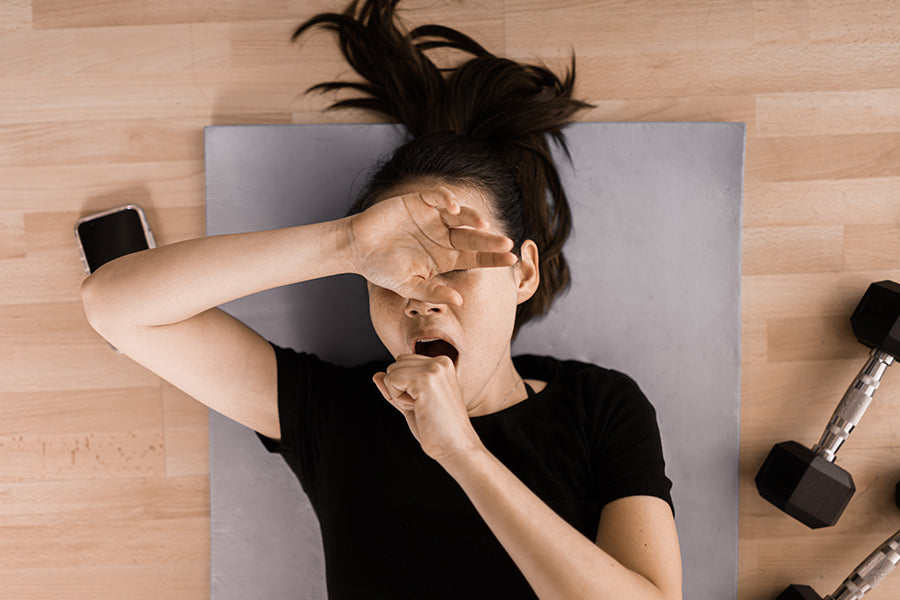Feeling good after a hard evening workout can be immensely satisfying, but it may also affect your ability to relax and get enough sleep that night. Many of us think that our workouts should end just before bedtime, but working out too close to bedtime can cause insomnia or interfere with proper restorative rest.
For those looking to make the most out of their gym sessions without sacrificing quality sleep afterward, this blog post will discuss why exercise can sometimes cause insomnia and offer six helpful tips on avoiding sleepless nights following your evening workouts. Read on to learn more!
How Exercise Affects Your Sleep
Exercise benefits you in many ways — from maintaining a healthy weight to improving your mental and physical well-being. But it may surprise you that regular exercise can also affect your sleeping habits.
Studies have found that although exercise helps people fall asleep faster and sleep more deeply, exercising too close to bedtime or strenuous workouts can lead to insomnia.
It's thought that intense activity increases arousal levels, stimulating hormones such as cortisol and adrenaline, which make you more alert instead of sleepy. Our brains are wired in such a way that physical activity can affect our sleep patterns.
This is because exercise triggers the production of certain hormones, such as cortisol and adrenaline, which can increase our alertness. These hormones activate neurological pathways in the brain that lead to higher alertness levels, making it difficult for us to fall asleep.
Related Article: Optimizing Sleep With Exercise for Improved Performance
Causes of Sleep Troubles After Working Out
Causes of sleep troubles after a workout can vary, but they generally tend to revolve around the following:
Sleep Hygiene Issues
Sleep hygiene refers to the habits and behaviours that contribute to healthy sleeping patterns. Sleep hygiene is essential when trying to avoid insomnia after evening workouts.
Poor sleep hygiene can lead to difficulty falling asleep and waking up in the morning, and it can also disrupt natural sleep cycles and cause irritability throughout the day.
Hormones
Hormones play a significant role in causing sleep troubles after evening workouts, as hormones such as cortisol and adrenaline are released during exercise and can create elevated alertness, making it difficult to fall asleep.
Studies have found that exercise leads to the release of dopamine and serotonin, two hormones associated with pleasure and reward, responsible for keeping you awake.
Raises Your Core Temperature
Exercising too close to bedtime can interfere with your body's natural cooling process. When you exercise, your core body temperature rises, and the body prepares itself for sleep through this cooling process.
Exercising elevates your temperature and heart rate, interfering with your body's ability to cool down and relax into sleep. It is best to exercise at least 2-3 hours before bedtime to ensure that your body has had time to return to its resting state before getting some rest.
Electrolyte Depletion
Electrolytes play an integral role in keeping us feeling and performing our best. Electrolyte depletion after working out can take a toll on our bodies, leading to low energy, dehydration, and poor sleep.
Exercising causes us to sweat, and the loss of electrolytes comes with it. Electrolyte depletion is common when we exercise, especially in hot weather or for long periods. When post-workout electrolyte levels drop too low, it can cause disturbances in our sleep patterns and lead to insomnia.
It is essential to replenish electrolyte levels with the appropriate diet or supplements to avoid this situation and get the restful sleep that our bodies need.
All these reasons can cause post-workout sleep troubles, so it's essential to consider all possible causes when trying to pinpoint why you're not getting the rest you need.
6 Things You Can Do to Prevent Post-Workout Insomnia
A good night's sleep benefits are almost too numerous to count: it helps you focus, fight stress and anxiety, and even improve your overall mood. But what if you're having trouble sleeping after a workout? There are some things you can do to prevent post-workout insomnia.
1. Have a Bedtime Ritual
Considering the importance of sleep, having a bedtime ritual can help to ensure a good night's rest after an invigorating workout.
To ensure that your exercise-induced insomnia doesn't take away from the benefits of a regular workout, create a bedtime ritual that helps you relax after a tough session.
You can quickly wind down your body and mind to get quality sleep by having a few go-to activities before bed. Ideas include taking a warm bubble bath or shower, reading one chapter from an exciting book, and listening to calming music—all activities that will help ease you into the evening routine for an effective way to avoid insomnia post-workout.
2. Get Into a Routine
Getting into a routine for sleeping following a workout is essential, as this can help you avoid insomnia. Taking time to rest after exercise or participating in lower-impact activities such as light stretching and deep breathing exercises aids the body in its recovery process.
It helps promote an opportunity for relaxation before trying to fall asleep. Setting up a consistent and comfortable post-workout environment with regular sleep habits is key to avoiding any sleep disturbances that exercise may cause.
3. Stay Cool
After a hard workout, it's essential to make sure that you stay cool to avoid developing any post-exercise insomnia. When the body becomes too hot after intensive activity, your temperature regulation system cannot bring down your temperature, affecting your ability to rest afterward.
Try taking a cold shower or simply drinking water and taking it easy after an intense exercise session to help yourself stay calm and get the best night's sleep!
4. Reduce the Intensity
Taking part in high-intensity workout activities too close to bedtime is one of the leading causes which disrupt your sleep. Exercise gives the body a sense of energy and excitement that can last for hours after the workout has ended.
Reducing the intensity of those late-evening workouts is vital to avoid feeling overly energetic or even sleepless after exercise. Reduce the number of reps and sets you're doing, focus on low-intensity exercises such as yoga or stretching, or consider cutting your late workouts shorter.
Reduce the intensity, and you'll likely feel relaxed and ready for restful sleep.
5. Supplementing With Vitamin C
In addition to the tips mentioned above, supplementing with vitamin C is another effective way to reduce post-workout insomnia. Vitamin C is an essential nutrient that helps support healthy immune function and plays a vital role in helping us maintain our energy levels.
Studies have shown that taking Vitamin C post-workout can help regulate our circadian rhythm even better; it does so without any adverse side effects. So next time you hit the gym, remember to take some Vitamin C afterward and enjoy a good night's sleep.
6. Avoid Screens
It's crucial to avoid screens right before bed. That includes TVs, phones, tablets, and computers because the blue light emitted by these devices has been known to disrupt your natural circadian rhythm.
Many nighttime activities, such as scrolling through social media or watching TV, stimulates your brain and increases alertness which is the opposite of what you want when trying to get a good night's rest.
Avoiding screens before sleep will help reduce insomnia symptoms post-workout and promote healthy sleeping habits.
Related Article: Feeling Tired While Working Out? Top 10 Reasons
FAQs
1. Can working too hard cause insomnia?
Yes, working too hard can cause insomnia. Working long hours and putting too much strain on the body can lead to physical exhaustion, resulting in difficulty sleeping or even insomnia.
This is because when we are under physical or mental stress, our bodies produce the hormone cortisol, which is associated with alertness. When cortisol levels become elevated due to physical or mental stress, it can result in difficulty sleeping or insomnia.
2. What are the leading causes of insomnia?
The leading causes of insomnia can vary from person to person. Still, some of the more common causes include physical and mental stress, consuming caffeine or nicotine too close to bedtime, poor sleep hygiene habits such as using phones or laptops in bed, eating a big meal late at night, having an irregular sleep schedule, and working out late in the evening.
3. How can I prevent post-workout insomnia?
You can try the following tips to prevent post-workout insomnia:
- Having a bedtime ritual
- Getting into a routine
- Staying cool
- Reducing the intensity of your workout
- Supplementing with Vitamin C
- Avoiding screens before bedtime
4. Does an evening workout cause insomnia?
Yes, an evening workout can cause insomnia. Working out in the evening causes your body to become energized and alert, which is the opposite of the relaxed state needed to fall asleep. Exercise increases the production of stress hormones such as cortisol and adrenaline, which can keep you alert and awake even after the workout.
The Bottom Line
Finding the right balance of exercise and relaxation to wind down before sleep is crucial. Be aware of how your body responds to exercise, and avoid doing anything that will cause you more stress before bedtime. By understanding how exercise affects your sleep and knowing the causes of sleep troubles after working out, you can take steps to avoid insomnia. Use the six tips above to help you sleep well and avoid post-workout insomnia.
Reading List
Article Sources
- Basso, Julia C., and Wendy A. Suzuki. “The Effects of Acute Exercise on Mood, Cognition, Neurophysiology, and Neurochemical Pathways: A Review.” Brain Plasticity, vol. 2, no. 2, pp. 127–52. PubMed Central, https://doi.org/10.3233/BPL-160040
- Otocka-Kmiecik, Aneta, and Aleksandra Król. “The Role of Vitamin C in Two Distinct Physiological States: Physical Activity and Sleep.” Nutrients, vol. 12, no. 12, Dec. 2020, p. 3908. PubMed Central, https://doi.org/10.3390/nu12123908.
- Taylor, Daniel J., and Brandy M. Roane. “Treatment of Insomnia in Adults and Children: A Practice-Friendly Review of Research.” Journal of Clinical Psychology, vol. 66, no. 11, Nov. 2010, pp. 1137–47. DOI.org (Crossref), https://doi.org/10.1002/jclp.20733.













